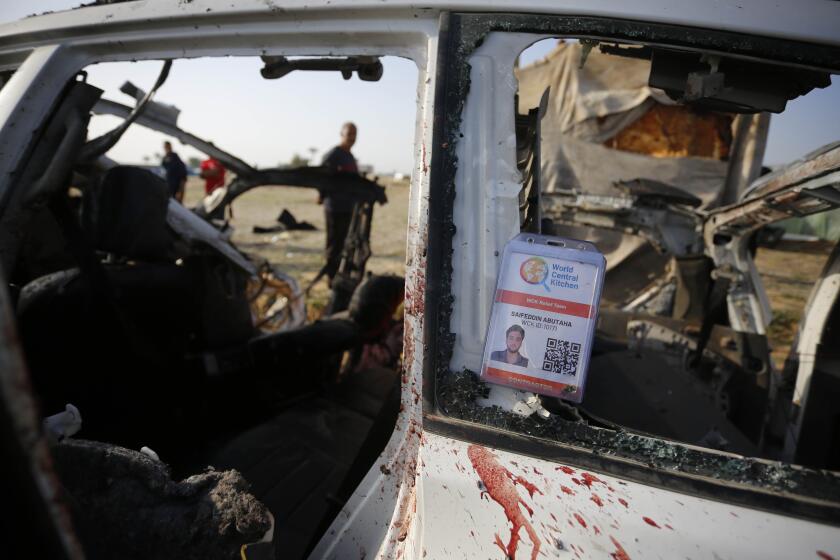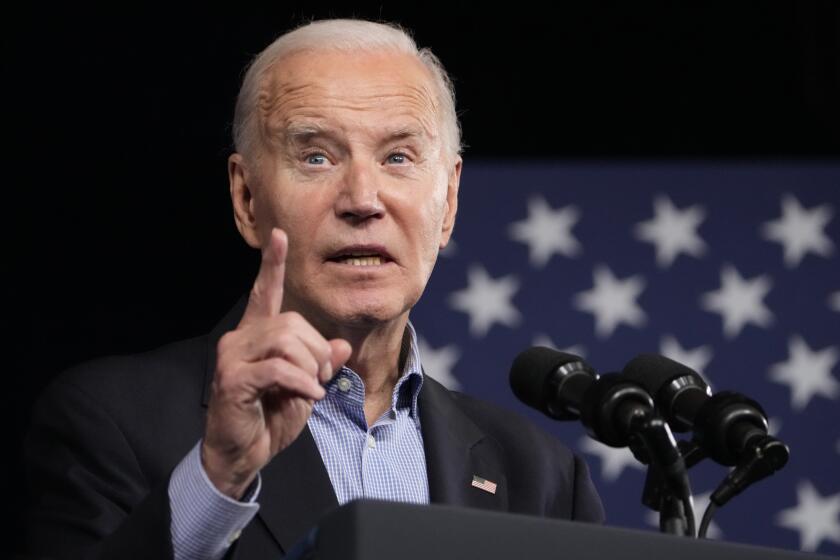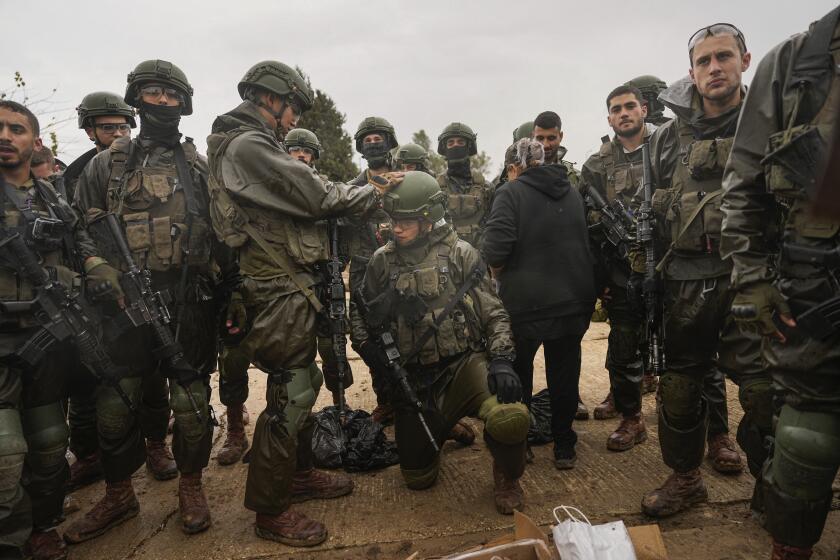Biden tells Israel’s Netanyahu future U.S. support for war depends on new steps to protect civilians

- Share via
WASHINGTON — President Biden issued a stark warning to Israeli Prime Minister Benjamin Netanyahu on Thursday that future U.S. support for Israel’s Gaza war depends on the swift implementation of new steps to protect civilians and aid workers.
Biden and Netanyahu’s roughly 30-minute call just days after Israeli airstrikes killed seven food aid workers in Gaza added a new layer of complication to the leaders’ increasingly strained relationship. Biden’s message marks a sharp change in his administration’s steadfast support for Israel’s war efforts, with the U.S. leader for the first time threatening to rethink his backing if Israel doesn’t change its tactics and allow much more humanitarian aid into Gaza.
The White House would not specify what could change about U.S. policy, but it could include altering military sales to Israel and America’s diplomatic backup on the world stage.
Netanyahu’s office said early Friday that his Security Cabinet has approved a series of “immediate steps” to increase the flow of humanitarian aid into Gaza, including the reopening of a key crossing that was destroyed in the Oct. 7 Hamas attack.
Staffers from World Central Kitchen, chef José Andrés’ humanitarian aid group trying to get food to Palestinians in Gaza, were killed in Israeli airstrikes.
Administration officials had said before that announcement that the U.S. would assess whether the Israeli moves go far enough.
Biden “made clear the need for Israel to announce and implement a series of specific, concrete, and measurable steps to address civilian harm, humanitarian suffering, and the safety of aid workers,” the White House said in a statement after the leaders’ call. “He made clear that U.S. policy with respect to Gaza will be determined by our assessment of Israel’s immediate action on these steps.”
Biden also told Netanyahu that an “immediate cease-fire is essential” and urged Israel to reach such an accord “without delay,” according to the White House, which described the conversation as “direct” and “honest.”
Netanyahu’s office said the Erez crossing, which for years served as the only passenger terminal for people to move in and out of Gaza, would be temporarily reopened. It also said Israel would allow its Ashdod port to be used to process aid shipments bound for Gaza and allow increased Jordanian aid shipments through another land crossing. The announcement did not elaborate on quantities or types of items to be let in.
President Biden says he believes Israeli Prime Minister Netanyahu is ‘hurting Israel more than helping’ in his approach to war against Hamas in Gaza.
White House National Security Council spokesperson Adrienne Watson welcomed the moves by Netanyahu, adding that the plan “must now be fully and rapidly implemented.”
“As the president said today on the call, U.S. policy with respect to Gaza will be determined by our assessment of Israel’s immediate action on these and other steps, including steps to protect innocent civilians and the safety of aid workers,” Watson said.
The leaders’ conversation comes as the World Central Kitchen, founded by restaurateur José Andrés to provide immediate food relief to disaster-stricken areas, called for an independent investigation into the Israeli strikes that killed the group’s staff members, including an American citizen.
The White House has said the U.S. has no plans to conduct its own investigation.
Separately, Secretary of State Antony J. Blinken told reporters in Brussels that U.S. support would be curtailed if Israel didn’t make significant adjustments to how it’s carrying out the war. “If we don’t see the changes that we need to see, there will be changes in our policy,” he said.
White House national security spokesman John F. Kirby echoed the call for “tangible” and “concrete” changes to be taken by the Israelis beyond reiterating long stated calls for allowing additional aid to get into Gaza.
“If there’s no changes to their policy in their approaches, then there’s going to have to be changes to ours,” Kirby said. “There are things that need to be done. There are too many civilians being killed.”
The demands for Israel to bring the conflict to a swift close were increasing across the political spectrum, with former President Trump, the Republicans’ presumptive nominee to face Biden this fall, saying Thursday that Israel was “absolutely losing the PR war” and calling for a resolution to the bloodshed.
President Biden and Israeli Prime Minister Benjamin Netanyahu hold their first call in more than a month as tensions between the allies have grown.
“Get it over with and let’s get back to peace and stop killing people. And that’s a very simple statement,” Trump told conservative radio host Hugh Hewitt. “They have to get it done. Get it over with and get it over with fast because we have to — you have to get back to normalcy and peace.”
Biden and Netanyahu also discussed Iranian threats against Israel, Kirby said. This week, Iranian leaders vowed to hit back after an airstrike widely blamed on Israel destroyed Iran’s consulate in Syria, killing 12 people, including two elite Iranian generals. Iranian President Ebrahim Raisi said Wednesday that the attack “will not remain without answer.”
Biden also renewed his concerns about Netanyahu’s plan to carry out an operation in the southern Gaza city of Rafah, where about 1.5 million displaced Palestinians are sheltering, as Israel looks to eliminate Hamas after the militant group’s deadly Oct. 7 attack. Vice President Kamala Harris, Blinken and national security advisor Jake Sullivan also joined the call.
Still, the Biden administration has proceeded apace with arms transfers and deliveries to Israel, many of which were approved years ago but had been only partly or not at all fulfilled. Just this week, on Monday, the Democratic administration’s “Daily List” of munitions transfers included the sale to Israel of more than 1,000 500-pound bombs and more than 1,000 1,000-pound bombs.
Officials said that those transfers had been approved before the publication of the list Monday — the day Israeli airstrikes hit a World Central Kitchen aid convoy in Gaza, killing seven of the group’s employees — and that they fell below the threshold for new congressional notification. Also, they noted that the bombs are not for delivery to Israel until 2025.
After Hamas’ attack, the U.S. pledged full support for Israel. Now, as the death toll in Gaza skyrockets, President Biden is trying to rein in Netanyahu.
Meanwhile, the Pentagon on Thursday said plans to build a temporary pier off the coast of Gaza to help boost the flow of aid into the territory continue to move forward. Maj. Gen. Pat Ryder, the Pentagon press secretary, said the pier will be on line by the end of the month or early May. Biden announced plans to build the floating pier during his State of the Union address last month.
Ryder said Israel has agreed to provide security on the shore as aid is transferred and distributed, but details are still being worked out.
Israel has acknowledged responsibility for the strikes but said the convoy was not targeted and the workers’ deaths were not intentional. The country continues to investigate the circumstances surrounding the killings.
Andrés harshly criticized the Israeli military for the strike, and his organization has paused its work in Gaza.
“The Israeli government needs to stop this indiscriminate killing. It needs to stop restricting humanitarian aid, stop killing civilians and aid workers, and stop using food as a weapon,” he wrote on X. “No more innocent lives lost.”
The war in Gaza began when Hamas-led militants stormed into southern Israel, killing some 1,200 people, mostly civilians, and taking around 250 people hostage.
The Israeli military campaign in Gaza, experts say, is among the deadliest and most destructive in recent history. Within two months, researchers say, the offensive already has wreaked more destruction than the razing of Syria’s Aleppo between 2012 and 2016, Ukraine’s Mariupol or, proportionally, the Allied bombing of Germany in World War II. It has killed about 33,000 people, according to Gaza’s Health Ministry — more than the U.S.-led coalition did in its three-year campaign against the Islamic State group.
Madhani and Miller write for the Associated Press. AP writers Matthew Lee in Brussels, Jill Colvin in New York, Colleen Long and Chris Megerian contributed.
More to Read
Sign up for Essential California
The most important California stories and recommendations in your inbox every morning.
You may occasionally receive promotional content from the Los Angeles Times.













